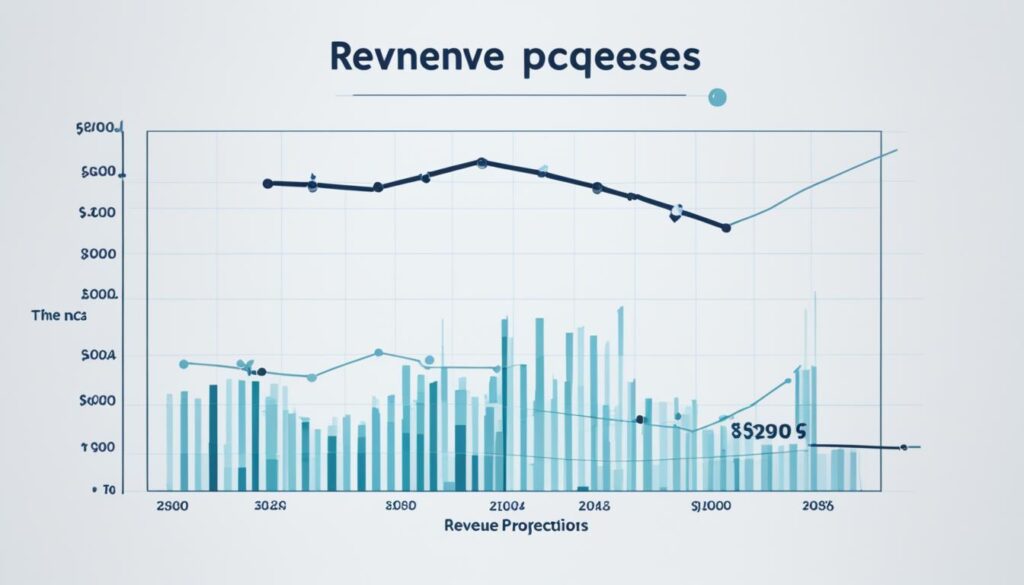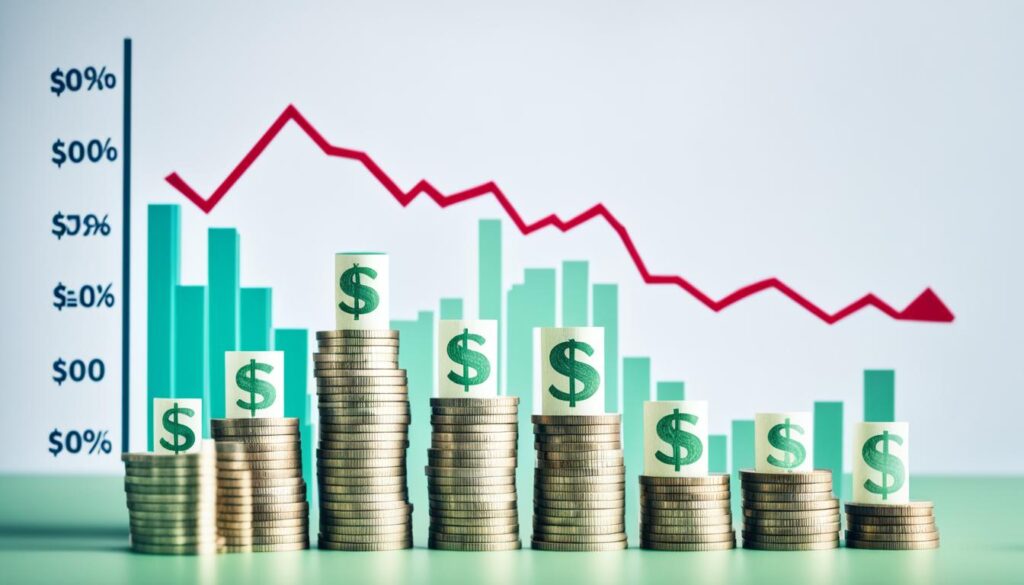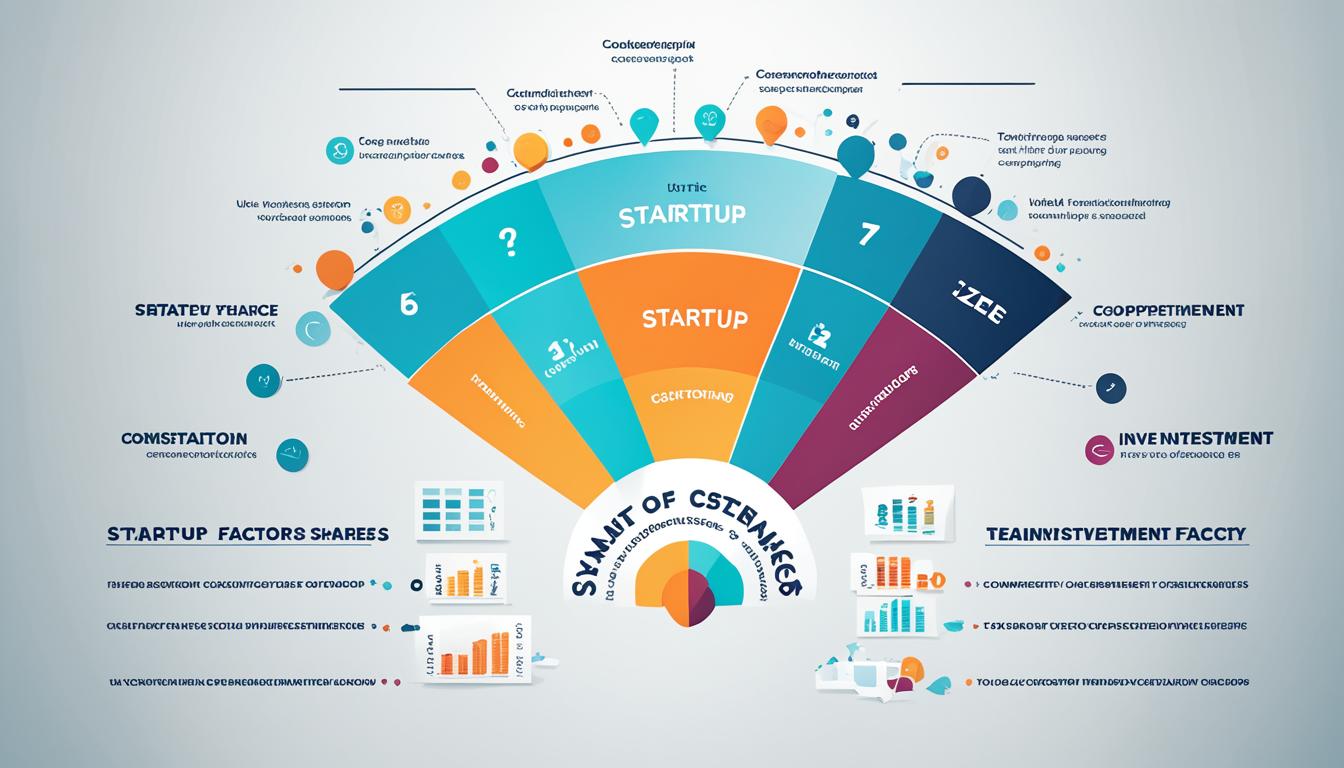Do you wonder how venture capitalists (VCs) pick the money they’ll put into a startup? This guide dives into the main points that influence their choice. By learning about this process, you can get your startup ready to snag the right funding for growth and success. So, here’s a question to get us started: Do VCs invest in startups based on a gut feeling, or do they follow a well-defined process?
Key Takeaways
- Venture capitalists carefully evaluate the potential of a startup’s business when determining the investment amount.
- The founding team’s expertise, experience, and leadership capabilities are critical factors in a VC’s investment decision.
- VCs closely scrutinize a startup’s financial projections to understand its potential for growth and profitability.
- Valuation methodologies and negotiation of investment terms are crucial in deciding the final investment amount.
- Post-investment support, such as board representation and strategic guidance, is an important aspect of a VC’s involvement.
Understanding the VC Investment Process

Venture capital (VC) is key for startups. It gives not just money but also advice, know-how, and networking. VCs are the ones who choose how much to invest in a startup. It’s useful to know what VC is and VCs’ role in startup funding to grasp this part better.
What is Venture Capital?
Venture capital is money given by special firms to young companies with lots of room to grow. These firms look for startups with new and exciting ideas. They invest in them to help them grow fast and make big profits.
The Role of VCs in Startup Funding
VCs are more than just money givers. They are like growth partners for startups. They don’t just offer cash; they share their insights, knowledge, and contacts. This support can make a big difference for startups. It helps them make smarter plans, hire the right people, and steer through tough times.
Learning about the VC investment process is crucial for startups. It helps them get ready to get the funding they need to succeed. We’re going to look at what VCs think about when they decide on investment amounts in startups next.
Evaluating the Business Potential

When venture capitalists (VCs) look at a startup, they focus on its business potential. They pay close attention to the market size and growth potential and the competitive landscape.
Market Size and Growth Potential
VCs look at the size and growth of the market the startup is in. They consider if the startup can win a big piece of the market. VCs study trends, population changes, and new technologies. This helps them figure out how big the market can get and how fast. Knowing the market helps VCs see the startup’s future business success.
Competitive Landscape Analysis
VCs also check out the competitive landscape. They want to know if the startup has an edge over other companies. VCs think about what the competition is doing well and where they fall short. They look at things like what the competitors offer, their prices, and how loyal their customers are. This research shows if the startup can stand out and stay ahead. It helps VCs see if the startup can do well and grab a good share of the market.
After looking at the market and competition, VCs can make smart choices. They can decide the right value for the startup and how much money it needs. This way, they can help the startup grow and be successful in the long run.
Assessing the Founding Team

Investors, like venture capitalists (VCs), consider a startup’s founding team very important. They know the founding team must have the right skills and ambition to succeed. VCs check if the team can turn their business plan into reality and help the startup grow.
VCs seek out talented, experienced, and dedicated people who know their field well. They want to see the founding team’s expertise and successful past projects. They also look at how well the team works together.
Importantly, VCs like to see startup leadership with a strong, adaptable strategy. They want to see the team’s skill in growing a business. This includes how they draw in and keep high-quality employees.
VCs focus on the founding team’s expertise, experience, and leadership strengths. Their confidence in the startup’s future success grows with each detail they uncover. Judging the founding team is key in VCs’ investment decisions. It helps them predict if the startup will reach its big plans.
Analyzing the Financial Projections

When venture capitalists (VCs) look into a startup, they carefully study its financial forecasts. This study lets them check how likely the startup is to grow. Also, they see if it can make enough money over time. They look closely at what the startup predicts for its revenue and growth, and how much money it’s spending (burn rate) and how long it can survive without more funds (runway).
Revenue and Growth Forecasts
VCs review the startup’s estimates on how much money it will make. They want to know if these goals are realistic. They make sure the startup’s plans match what’s happening in its market and if it can stand out. Understanding if the growth forecasts make sense is key for VCs. They need to believe the startup can grow and take a big slice of the market.
Burn Rate and Runway
The time a startup can keep going without new funds (runway) and how fast it uses money (burn rate) are both important to VCs. They check these numbers to understand if the startup is good at managing cash. They also make sure the startup has enough time and money to reach its goals.
| Metric | Description | Importance to VCs |
|---|---|---|
| Financial Projections | The startup’s forecasts for revenue, expenses, and profitability. | VCs use these to see how much the startup might grow and if its plan is doable. They also look at the chances of making a steady profit. |
| Revenue Forecasts | The startup’s predictions on future sales and money growth. | VCs check how realistic these forecasts are to understand the startup’s market and position in it. |
| Growth Forecasts | The startup’s plans for getting more users, a bigger market share, and growing overall. | VCs review these to see if the startup can get a big part of its target market. |
| Burn Rate | How fast the startup is using up its money. | VCs look at this to see if the startup is good with its money and has enough time to meet its goals. |
| Runway | How long the startup can keep going on its own before needing more funds. | VCs study this to check the startup’s financial health and see when it might need more funding to grow. |
By really digging into the startup’s financial projections, revenue forecasts, growth forecasts, burn rate, and runway, VCs get a full look at the startup’s potential. They also figure out how much money is needed to help it succeed.
How Do VCs Decide How Much to Invest?

For venture capital (VC) investments, deciding how much to invest is crucial. VCs use different valuation methodologies to figure out a startup’s value. Then, they determine the right amount to invest.
Valuation Methodologies
VCs look at a startup’s market opportunity. They focus on its ability to make a lot of money, often eyeing a $1 billion market. They want to invest in companies that can be top players in their fields.
To find a startup’s value, VCs use methods like discounted cash flow analysis. They also check against what similar companies are worth. This helps them decide how much to invest.
Negotiating the Investment Terms
After setting the value, VCs and entrepreneurs talk about the investment terms. They discuss the share of ownership, control, and other details. These are meant to make everyone happy and align their goals.
The negotiation process is key. It helps VCs lower their risks and aims for a good investment return. They look at the startup’s leaders, how strong it is compared to others, and its plans to handle risks.
Understanding how VCs make their decisions helps entrepreneurs. They can get ready to ask for the right amount of funding. This way, they can grow and succeed.
Due Diligence and Investment Structuring

Before investing, venture capitalists (VCs) dive into a deep due diligence process. They check the startup’s claims to make sure the investment is wise. This means looking into both the startup’s legal and financial side.
VCs make sure all the money and interests involved line up. They examine the startup’s legal issues and finances. This is to secure a strong foundation for the investment deal.
Legal and Financial Due Diligence
The legal due diligence looks at the startup’s legal documents and rights. It checks if they follow the law and if there are any big legal risks. VCs and legal experts review everything from contracts to patents to spot any issues.
VCs also do a full financial due diligence. They review the startup’s financial documents. This includes their cash flow, how they make money, and their costs. They make sure the numbers line up with what the startup first presented.
Structuring the Investment Deal
After finding the startup solid, VCs move on to plan the investment deal. They use term sheets to detail everything. This includes how much money the startup gets, who gets what, and other important terms.
The negotiation part with the startup’s founders is key. They strive to agree on terms that work for everyone. The goal is to get the startup funded while allowing the VC a level of protection.
| Due Diligence Aspects | Key Considerations |
|---|---|
| Legal Due Diligence | Corporate structure, intellectual property, regulatory compliance, potential legal risks |
| Financial Due Diligence | Financial statements, cash flow projections, revenue model, cost structure |
| Investment Deal Structure | Capital amount, ownership stake, control provisions, special rights, and preferences |
Post-Investment Involvement

After investing, venture capitalists (VCs) stay involved with their startup investments. They play an active role by providing support, using their industry knowledge, and connecting with others. This engagement includes post-investment support, board representation, strategic guidance, and mentorship.
Board Representation
VCs often sit on the boards of their portfolio companies. This puts them in a key position to provide strategic direction. They help set the company’s goals, offer insights, and ensure the startup moves forward successfully.
Strategic Guidance and Mentorship
Besides board roles, VCs give strategic guidance and act as mentors. They share their knowledge and network to help startups face problems, spot new chances, and shape their strategies. This VC value-add helps CEOs overcome challenges and meet their objectives.
Key Factors Influencing Investment Decisions
Venture capitalists (VCs) look at many aspects before they decide how much to invest in a startup. They think about trends in the market, the size of their fund, and their own investment strategy. These play a big part in their choices.
Industry Trends and Market Conditions
VCs keep a close eye on what’s happening in different industries and the general market. This awareness helps them understand if a startup is likely to do well or face challenges in growing. For example, they might invest more in a fast-growing field. But if the market is tough, they might wait and see how the startup handles it before investing more.
VC Fund Size and Investment Strategy
The size of the VC’s fund also affects how much they can invest. Bigger funds can invest more money, while smaller ones have to be cautious. The type of startups they usually invest in matters too. Some may like to support very new businesses with less money. Others prefer to wait until a company is already growing before they invest more.
Looking at both the big picture and the details of each startup, VCs can figure out the right amount to invest. This helps the startup grow and increase its chances of success.
